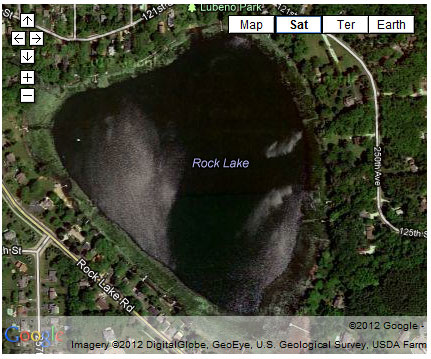 Two different groups, each with a stake in the future of Rock Lake in southern Salem, met Monday at Town Hall to discuss the issues between them.
Two different groups, each with a stake in the future of Rock Lake in southern Salem, met Monday at Town Hall to discuss the issues between them.
People aligned with the Rock Lake Highlands Association sat on one side of the room and those affiliated with the Rock Lake Restoration Association sat on the other. There were some moments of tension when the fundamental differences between the groups was discussed — whether to harvest or treat Eurasian milfoil on the lake.
Over 40 people attended.
But in the end, leaders of both groups said they were willing to talk more with each other on lake management issues.
The conflict over harvesting — in this case using a specialized watercraft to cut and remove milfoil from the lake — reached the boiling point June 9. That day, a harvester hired by Rock Lake Restoration Association and permitted by the Department of Natural Resources, was stopped from entering the lake after invasive species Zebra mussels were discovered on the equipment and Rock Lake Highlands Association members blocked the access by standing in the water.
While there was a heated scene that day (some of the emotion which spilled over into the Salem Town Board meeting the following Monday) tonight both sides agreed the stopping of the harvesting June 9 was a good thing due to the contamination on the harvester.
About 50-acre Rock Lake is believed to be one of the few area lakes not infested with Zebra mussels.
A state Department of Natural Resources said the harvester incident has stirred considerable discussion within the DNR about the need for inspecting the few harvesters that do not stay in one lake.
While a pre-launch inspection of a harvester is not required by statute, Rob McLennan of the DNR pledged that the harvester to be used on Rock Lake will have one.
“You will have an inspection of that harvester before it goes in the lake,” McLennan said.
The non-inspection of harvesters exposed a loophole in the state’s efforts to control transport of invasive species from lake to lake.
“This is a good thing that happened,” Warden Supervisor Jennifer Niemeyer said. “I’ve talked to members of each side and they’ve said that.”
But the agreement between the two groups seemed to stop at the consensus that not introducing a zebra mussel infested weed harvester into Rock Lake was a good idea.
Rock Lake Restoration Association members want harvesting to decrease weed growth on the lake and provide access through weed beds near shore to open water.
“What the harvesting is about is relief,” said David Hoke, Rock Lake Restoration Association spokesman. “We need relief.”
Rock Lake Highlands Association members generally oppose harvesting.
“We don’t agree with the management plan at all,” said Erik Backe, president of the Rock Lake Highlands Association. “We want to take a slower approach. Our fear is that it will be out of control.”
Others present at the meeting urged the groups to try to approach future management of the lake as a single group.
McLennan said a Southeast Wisconsin Regional Planning Commission survey of the lake, arranged by Rock Lake Restoration Association, and the resulting planning afterwards could be a good process to unite the two groups.
DNR Warden Kyle Dilley compared the current situation between the groups to two parents trying to use opposite methods to raise a child.
“I just encourage you all to make some sort of agreement,” Dilley said. “We’ve heard both sides. I don’t think we’ve got too far. I don’t see us getting anywhere right now.”
Town Supervisor Mike Culat, a former Rock Lake resident, was mediating the meeting Monday night. He suggested the groups designate three members each to work on a joint management plan.
Monday’s meeting ended without a next meeting date for that joint sub committee. Afterwards Backe said the Highlands group was willing to participate and Hoke said he was open to better communication between the groups.
Culat noted that people from both sides were having casual conversations after the meeting.
“At least we opened the lines of communication,” Culat said.




I do not think that cutting milfoil and Curly Leaf Pond will not get rid of it. It needs to be treated. The DNR would know more about this. I think that cutting milfoil and Curly Leaf Pond will only make it grow more quickly and spread aggresively. I am surprised that the DNR has not suggested treatment as opposed to cutting.